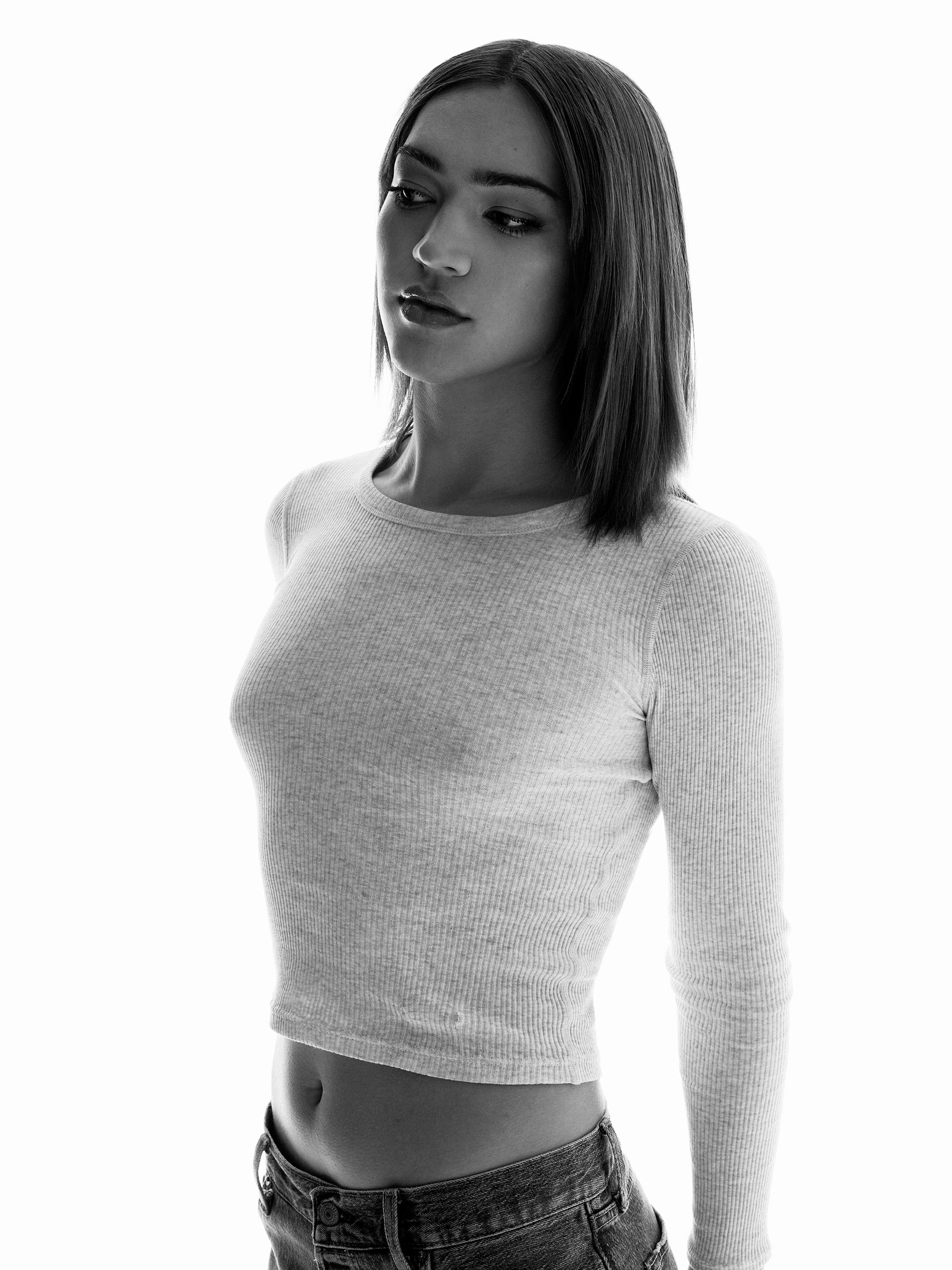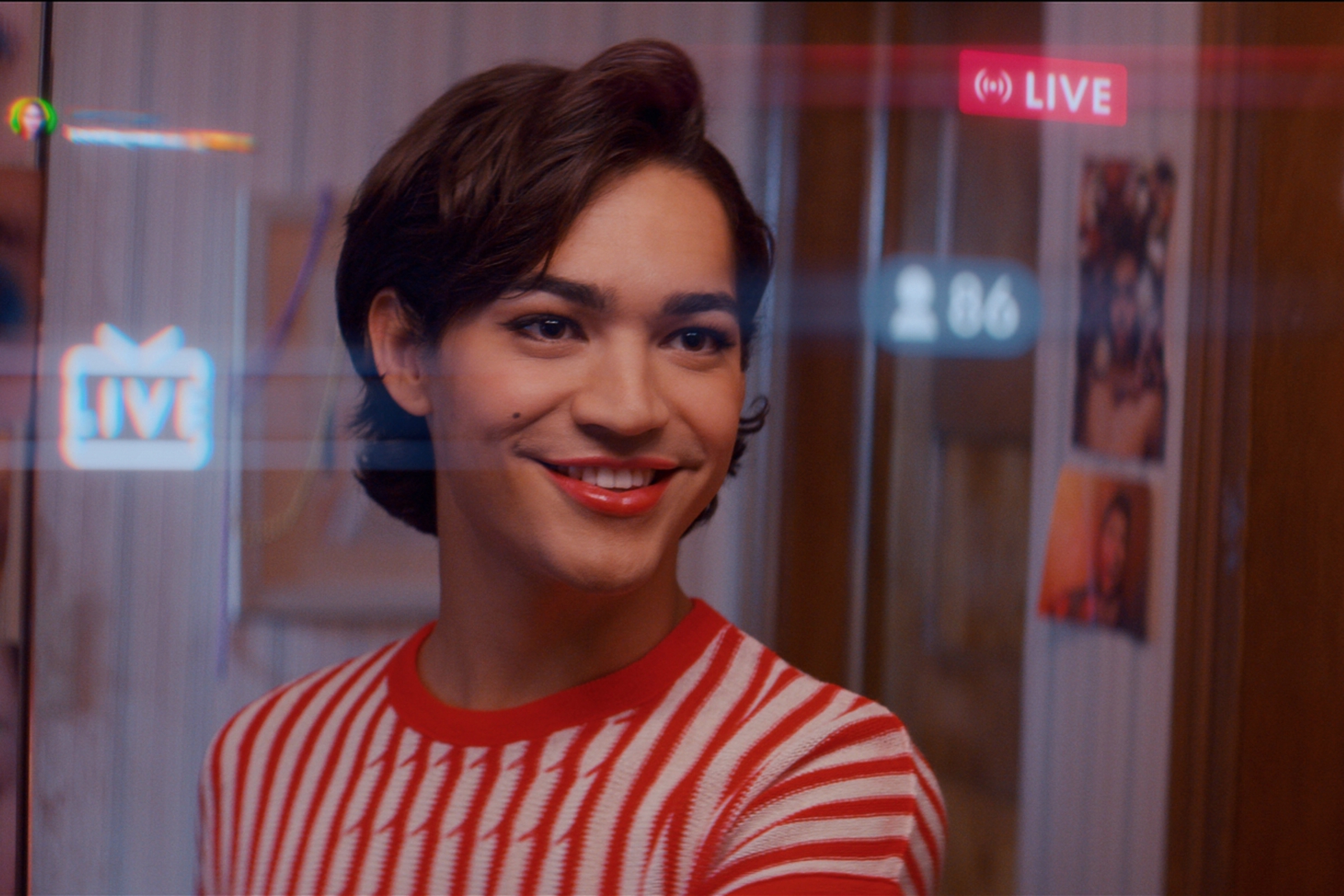
It’s currently the long-awaited sunny turn of a particularly gloomy spring in Los Angeles, and I’m killing time by doom-scrolling about the future of trans healthcare in America while a controversial blue pill dissolves under my tongue. The gap is quickly closing between now and June 22: the day that my television series Glamorous will come out on Netflix. And along with it, I too will come out as the transgender woman I’ve been privately living as for the last few years.
I’m a proud person, but admittedly it’s still a bit daunting to say those words publicly. To list the reasons why could sway “heavy,” and even “depressing as hell,” so in an effort to keep it light and tight… let’s just say I’m one of those girls who grew up in a religious Texas household where queerness was totally not the vibe. I was homeschooled so as to not be exposed to anything that might tamper with the Christian faith my parents raised me in. But by 8 years old I was praying every night to wake up and somehow be like my sisters. In the morning I would wake up in the same body, and cry. Over time I became highly aware of how unwelcome LGBT topics would be in my hometown. And so I kept my head down and looked for an immediate escape.
I moved to L.A. when I was 14 as a way to get out of Texas, establish my own identity, and, hopefully, make a career as an actor. But I instead endured years of rejection in auditions because it “wasn’t time for someone like me.” I entered relationships where my femininity was subject for negotiation. And over time, I learned to quiet the colorful parts of myself and make peace with my dreams remaining dreams.
More from TIME
When I was 19, I was stuck and figuring out what to do next with my life. I was assisting on a Madison Beer photoshoot when I got a phone call. My manager told me, “There’s this show in development called Glamorous and the producers have you in mind for it.” The show was a coming-of-age comedy about a gender-nonconforming queer Latino makeup fanatic. In a fabulous reference to Mia’s audition in La La Land, I recall thinking, “No, this one will kill me.”

At my first audition, I arrived as a diet version of myself so as not to subject myself to the usual rejection I’d faced. But this time, I was met with the encouragement to be myself and let my full femininity shine. They told me in the room that the role of Marco was mine, and I fell to my knees with tears in my eyes. This was the first time in my life somebody looked at me and said, “Yes, it’s time for you.”
But life had some curveballs to throw, and the show didn’t go forward at its original network. And then the pandemic hit in 2020. My gender dysphoria was getting brutal, and I couldn’t run from myself anymore.
Toward the end of 2020, I heard about a show called Veneno. There’s a scene in the series where the main character, a young queer person, meets their icon, an elder transgender woman who goes by the stage name La Veneno. The young queer person gets to ask her, “When did you start transitioning?” And Veneno answers and turns to her admirer to ask, “And when will you start?”
It was a punch to the gut. Because I knew that if somebody asked me that question, I would become painfully aware of how much time I felt I had wasted by not transitioning sooner.
And so as time went by, I privately transitioned in my day-to-day life. It felt as if I had lived with a stuffy nose my whole life and then suddenly my breathing airways opened, and I discovered everybody else has been breathing freely the whole time. And now, I too can breathe and enjoy my life the same way everyone else does.
And then, out of nowhere, I got the call that Netflix had ordered Glamorous to series. My dream came true. I had uprooted my life in Texas as a teenager, crashed on strangers’ couches, rented tiny spare rooms. I’d done whatever I could to afford my life in L.A. in pursuit of this dream. But suddenly, a realization: they hired me to play Marco—a boy. And that was no longer me anymore. I spent about a month just pacing around my room, trying to figure out what to do.
One day the creator of the show, Jordon Nardino, called me to discuss Marco’s character arc throughout the season. I met him at a bar in Silver Lake, and I told him about my transition. I knew this was different from the original plan, but I felt we could include this journey in the show by having Marco transition alongside my transition in real life. I braced myself for the worst, but instead we bonded over our love for Veneno and expressed how we both wanted to make something with that kind of importance. He scheduled a dinner with executive producer Kameron Tarlow. And the three of us made a plan to present the idea to Netflix. These two men changed my life the moment they heard my story and promised to protect and support me in telling it the way I wanted to.

Netflix came onboard. In fact, the only concern was ever about my own personal comfort and, funnily, whether or not the pitch of my voice would change over the course of filming (lol!). And so, from that moment on, I worked closely with Jordon to ensure the authenticity of Marco’s identity in the show.
And it does feel authentic. It was really important that Marco’s trans-ness was not the plot of the show. It’s not a “twist” to surprise the audience. Instead, we get to watch a young queer person experiencing first love and heartbreak, career success and failure, and everything else that comes with being a young adult… while also discovering their identity in the background of life. Because being transgender is not something you do, it’s who you are.
In the year since we shot the series, the political space—and specifically the anti-trans movement—has been so overwhelming. I’ve started to feel a sense of, “Wow, this show is going to come out, and with that, I too will be coming out. I don’t know if I’m ready to be this vulnerable.” But then I am reminded that this fear is exactly why I wanted to include my transition in the show: Because I know that when I was a terrified queer kid in Texas, it was the queer joy I found in droplets online that guided me to my happiness. And if someone like me is out there feeling the weight of being othered, I want them to have a place they can see someone like us thrive and be celebrated.
I credit transgender actors, artists, and personalities like Elliot Page, Gigi Goode, Isis King, Dylan Mulvaney, Michaela Jae Rodrigeuz, Kim Petras, Chiquitita, Tommy Dorfman, Josie Totah, the cast of Veneno, the cast of Rupaul’s Drag Race, and so many more for showing me through the years what trans excellence and celebration can look like. And I hope to contribute the same. —with reporting by Laura Zornosa
More Must-Reads From TIME
- The 100 Most Influential People of 2024
- Coco Gauff Is Playing for Herself Now
- Scenes From Pro-Palestinian Encampments Across U.S. Universities
- 6 Compliments That Land Every Time
- If You're Dating Right Now , You're Brave: Column
- The AI That Could Heal a Divided Internet
- Fallout Is a Brilliant Model for the Future of Video Game Adaptations
- Want Weekly Recs on What to Watch, Read, and More? Sign Up for Worth Your Time
Contact us at letters@time.com